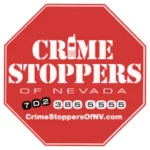Las Vegas Visitor Safety Tips
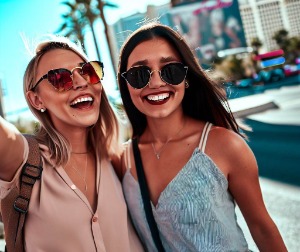
Ensuring Your Safety in Las Vegas
Las Vegas is a dynamic city known for its bustling nightlife, world-class entertainment, and iconic casino resorts. While it is generally a safe destination for tourists, it’s essential to stay vigilant and follow safety guidelines to ensure a pleasant visit. Here are some comprehensive safety tips to help you enjoy your time in Las Vegas without any worries.
General Safety Tips
- Stay in Crowded Areas: Stick to well-populated and tourist-friendly areas such as the Las Vegas Strip and Fremont Street. These areas are heavily patrolled by police and have enhanced security measures, including security officers, metal detectors, pat-downs, and security cameras.
- Avoid Walking Alone at Night: Whenever possible, travel with a companion or use transportation options like taxis or rideshare services. If you must walk alone, stick to well-lit and populated areas.
- Secure Your Belongings: Keep your valuables close and out of sight. Use a money belt or a secure bag to store your belongings, and never leave them unattended.
- Be Cautious with Personal Information: Be cautious when sharing personal information, especially credit card details. Use reputable and secure ATMs, and avoid providing sensitive information to unknown individuals or websites.
- Stay in Reputable Accommodations: Choose well-known hotels or resorts with good reviews and security measures.
- Follow Hotel and Casino Safety Guidelines: Familiarize yourself with the safety guidelines provided by your hotel or casino, including emergency exits and procedures.
Health and Medical Services
Las Vegas has several hospitals and urgent care centers that cater to visitors. Facilities like University Medical Center and Sunrise Hospital and Medical Center are well-equipped to handle emergencies. It’s also advisable to carry basic medical supplies and any prescription medications you may need.
Emergency Contacts and Services
In case of an emergency, dial 911 for police, fire, or medical assistance. Familiarize yourself with the location of the nearest hospital or urgent care center to your accommodation. Many hotels also have security personnel and medical staff on-site to assist guests.
For non-emergencies, call or visit online:
- Las Vegas Metro Police (non-emergency): (702) 795-3111
- Henderson Police (non-emergency): (702) 267-5000
- North Las Vegas Police (non-emergency): (702) 633-9111
Avoiding Common Scams
Las Vegas, like any major tourist destination, has its share of scams. Be wary of street performers asking for money, unsolicited offers for free show tickets, and overly friendly strangers. Always verify the legitimacy of any offers and avoid sharing personal information with unknown individuals.
Safety on the Las Vegas Strip
The Las Vegas Strip and downtown tourist areas, such as the Fremont Street Experience, have heightened security measures and a significant police presence. However, it is not devoid of risk. Here are some top safety tips for travelers to Las Vegas:
1. Stick to Crowded Tourist Areas: Do not wander past the crowds and tourist attractions. Avoid neighborhoods directly outside the Strip and Fremont Street, which may have higher crime rates.
2. Use Secure Transportation: Avoid walking long distances, especially at night. Use taxi cabs, rideshares, or the city bus system for safer travel.
3. Practice Car Safety: Remove all items and valuables from inside your vehicle, park in well-lit areas, and check your surroundings before getting in.
4. Be Mindful of Personal Items: Theft and pickpocketing are common. Keep your bags close and avoid displaying expensive jewelry or carrying large amounts of cash.
5. Beverage Safety: Accept drinks only from bartenders or wait staff, never leave your drink unattended, and be mindful of how much alcohol you consume.
6. Gamble Discreetly: Keep your cash winnings as credit in the machine until you’re ready to cash out, and never leave your slot machine or chips unattended.
Identifying Local Police and Security Staff
In Las Vegas, recognizing the unique uniform details allows visitors to identify and understand the roles of different LVMPD officers easily. These officers utilize various patrol methods, such as foot patrols, car patrols, bicycle patrols, motorcycle patrols, and equestrian patrols, each performing different responsibilities within the department.
The are Four Styles of Las Vegas Police Officer Uniforms:
1. Yellow Uniform (Traffic Officers)
- Shirt: Bright yellow, short-sleeve, or long-sleeve, with reflective strips for high visibility.
- Pants/Shorts: Black, matching the shirt’s style. Traffic officers often wear shorts in hot weather.
- Shoes: Black tactical boots.
- Hat: Black baseball cap with the LVMPD badge or insignia.
- Helmet: White motorcycle helmets with black visors when on duty on motorcycles.
- Belt: Black duty belt with standard police equipment, including a firearm, handcuffs, radio, baton, and pepper spray.
- Badge: Silver-colored, prominently displayed on the left chest.
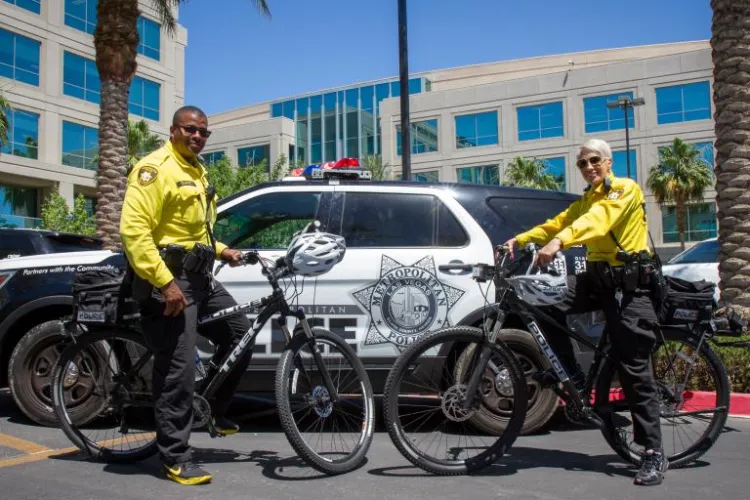
2. Brown Uniform (Corrections Officers)
- Shirt: Dark brown, typically short-sleeve, with a badge on the left chest.
- Pants: Dark brown, matching the shirt.
- Shoes: Black tactical boots.
- Hat: Usually not worn indoors, but outdoors, a dark brown cap or hat with the LVMPD insignia.
- Belt: Black duty belt with equipment similar to other officers, focused on corrections-related tools.
- Badge: Silver-colored, displayed on the left chest.
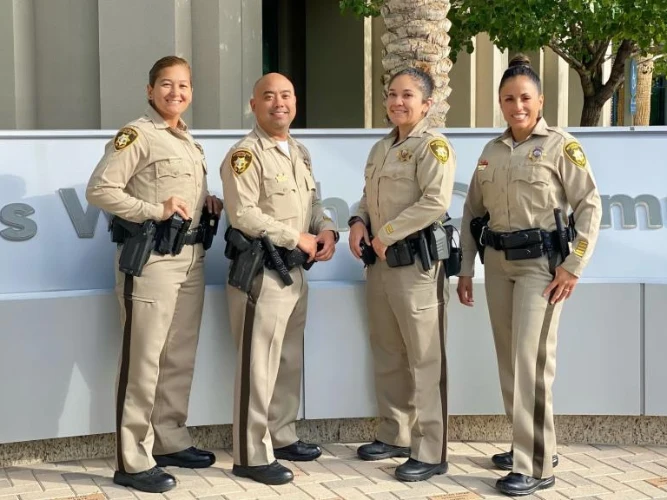
3. Tan Uniform (Patrol Officers)
- Shirt: Light tan, short-sleeve, or long-sleeve, with LVMPD patches on both shoulders.
- Pants: Dark green or brown, matching the shirt in style and material.
- Shoes: Black tactical boots.
- Hat: Tan or dark green baseball cap or a more formal hat with the LVMPD insignia.
- Belt: Black duty belt with standard police equipment, including a firearm, handcuffs, radio, baton, and pepper spray.
- Badge: Silver-colored, displayed on the left chest.
- Adornments: Officers may also wear rank insignia and service ribbons above the badge.
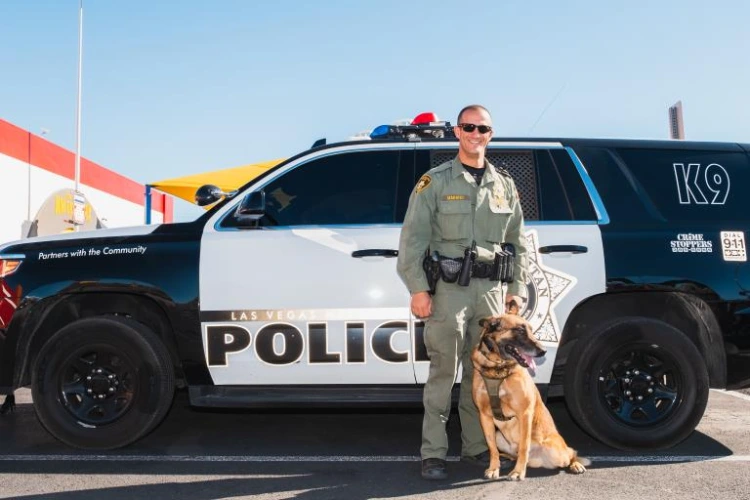
4. Volunteer Uniform
- Shirt: Typically white or another light color, short-sleeve with “Volunteer” and the LVMPD logo printed.
- Pants: Black or dark blue, less formal than full-time officers.
- Shoes: Comfortable black shoes or tactical boots.
- Hat: White or matching the shirt, with “Volunteer” and the LVMPD logo.
- Belt: Simple black belt, not as heavily equipped as full-time officers.
- Badge/Adornments: Volunteers do not carry the same badges as sworn officers but may have an ID badge or tag indicating their role.
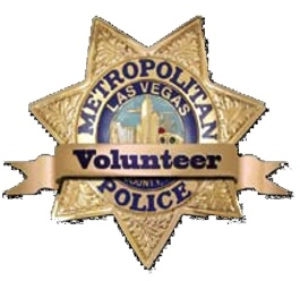
Equipment for All Officers
- Duty Belt: Standard issue typically includes the following equipment:
- Firearm: Issued sidearm.
- Handcuffs: Standard police handcuffs.
- Radio: For communication.
- Baton: Expandable baton.
- Pepper Spray: Standard issue for crowd control and self-defense.
- Taser: Some officers may carry a Taser as a non-lethal option.
- Body Camera: Increasingly common, worn on the torso to record interactions.
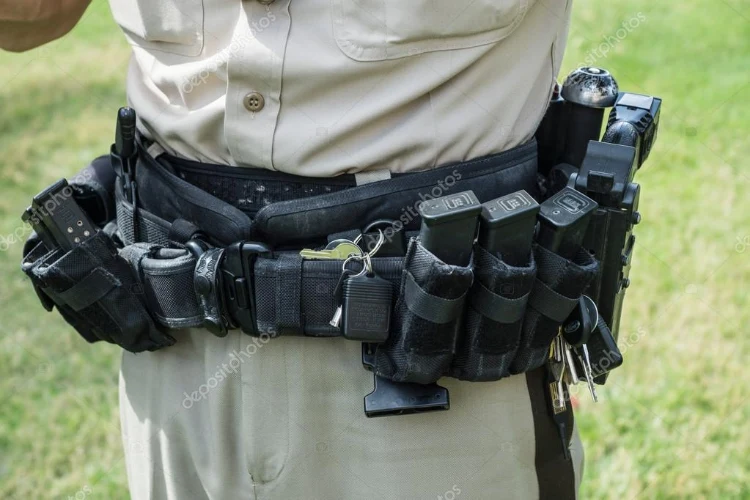
Potentially Dangerous Areas
While Las Vegas is generally safe, there are some areas with higher crime rates that may be less desirable for tourists. It’s best to avoid these neighborhoods entirely. Stick to well-populated and well-lit areas such as the Las Vegas Strip and downtown Vegas, where most of the popular attractions and hotels are located. Additionally, stay out of the flood-control tunnels. They can be dangerous due to sharp debris, drug needles, and possibly people who don’t want you disturbing them at home (true). Always Search Before You Explore. Research neighborhoods and areas online before visiting. Read what other tourists are saying and be mindful of places where gangs may be present.
Parts of Town to Avoid:
- Neighborhoods Near UNLV
– The areas surrounding the University of Nevada, Las Vegas (UNLV) can be less desirable for tourists due to higher crime rates. It’s best to avoid wandering around these neighborhoods, especially at night. - Reid International Airport Vicinity
– While the airport itself is safe, the neighborhoods nearby may have higher crime rates. Stick to main roads and well-lit areas when traveling to and from the airport. - Around the Stratosphere
– The vicinity around the Stratosphere can be sketchy, particularly at night. If you’re visiting this iconic landmark, be extra alert and avoid venturing too far from the main attractions. - Use The Sphere Walkway
– If you’re walking to the Sphere, it’s advisable to be extra cautious. There is an above-ground tunnel that is climate-controlled and considered safer. Use this route instead of walking on busy streets. - West of the Strip
– The areas west of the Strip, between the resorts and the I-15 freeway, are industrial and not well-lit. These areas are not well-patrolled and can be unsafe, especially at night. - East Fremont Street
– East Fremont Street, beyond the main downtown area, can be less safe, especially after dark. While the Fremont Street Experience is a bustling and secure tourist area, venturing further east can lead you into less desirable neighborhoods.\ - Naked City
– Located near the Stratosphere, Naked City is known for higher crime rates and should be avoided, particularly at night. Stick to well-traveled areas and avoid wandering into this neighborhood. - North Las Vegas
– Certain parts of North Las Vegas have higher crime rates. If you’re not familiar with the area, it’s best to avoid venturing into less populated or poorly lit neighborhoods. - West Las Vegas
– West Las Vegas has some neighborhoods with higher crime rates. If you need to visit this area, stick to the main roads and well-lit areas. - Industrial Road
– Running parallel to the Strip, Industrial Road can be unsafe, especially at night. This area is known for its industrial facilities and lacks the heavy security presence found on the Strip. - Boulder Highway
– Certain sections of Boulder Highway are known for higher crime rates. Exercise caution if you find yourself in this area, and avoid traveling alone at night. - Carey Avenue
– Carey Avenue in North Las Vegas is another area where tourists should exercise caution. Stick to main roads and avoid poorly lit or deserted areas. - Twain Avenue
– Twain Avenue, particularly west of the Strip, can be less safe. Avoid walking alone at night and stay on well-lit, busy streets.
Stay Away from Flood-Control Tunnels
Las Vegas has a network of flood-control tunnels that run beneath the city. While these tunnels are designed to manage water flow during heavy rains, they present significant safety hazards for anyone considering entering them:
- Dangerous Conditions: The tunnels are dark, filled with sharp debris and drug needles, and can flood rapidly during rainstorms.
- People Living in Tunnels: Some of the homeless population live in these tunnels. This can lead to potentially dangerous encounters, as residents may be protective of their space and not welcome intrusions.
- Unstable Environment: The tunnels are not maintained for regular foot traffic. They lack proper lighting and ventilation and can be structurally unsound in places.
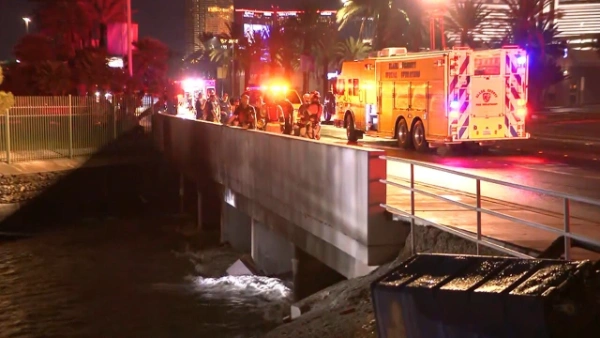
Watch Out for these Common Tourist Scams in Las Vegas
You’ll see plenty of street performers and costumed characters on the Strip. They often invite tourists to take photos with them. However, after the photo is taken, they demand a hefty tip. While tipping is customary, some may pressure you for more money than expected.
Timeshare representatives often lure tourists with free gifts, show tickets, or meals in exchange for attending a presentation. While these offers are most likely real, the presentations can be high-pressure and lengthy, often lasting several hours. The goal of these presentations is to sell you a timeshare. The sales tactics can be very aggressive, and the deals often aren’t as good as they seem. Always research before committing to any purchase.
Some taxi drivers may take longer routes to increase the fare, a practice known as long-hauling. To avoid this, research the best route to your destination beforehand or use a rideshare app that shows the route.
Rideshare services like Uber and Lyft use surge pricing during peak times. Be aware that prices can skyrocket during these times, and always check the fare estimate before confirming a ride.
Scalpers may sell fake or overpriced tickets for shows and events. Always buy tickets from reputable sources or directly from the venue to avoid counterfeit tickets.
Some operators offer tours at a bargain price but deliver subpar experiences or no tour at all. Verify the legitimacy of tour operators through reviews and official tourism websites.
Street gambling games like Three-Card Monte are designed to scam participants. The game is rigged, and you’re almost guaranteed to lose. Avoid participating in any street gambling activities.
Skimming Devices: Be cautious when using ATMs, as some may have skimming devices that steal your card information. Use ATMs located inside banks or well-lit, secure areas.
Fake ATMs: Fake ATMs can be set up to capture your card details and PIN. Stick to ATMs affiliated with major banks to avoid this risk.
Scammers may call your hotel room pretending to be the front desk and ask for your credit card details. Always visit the front desk in person to resolve any issues, or simply hang up and call them back from your hotel room’s phone.
Busy areas like the Strip and Fremont Street are prime spots for pickpockets. So are gathering areas such as the Conservatory at the Bellagio or any place that draws a crowd. Keep your valuables secure and be aware of your surroundings. Pickpockets often use distraction techniques, such as bumping into you or causing a commotion. Stay alert and keep your belongings close.
Drink spiking can occur in bars and nightclubs. Never leave your drink unattended, and avoid accepting drinks from strangers. Use the buddy system when going out at night. Keep an eye on each other’s drinks and stick together.
Scammers may pose as charity workers and solicit donations on the street. Verify the legitimacy of any charity before donating. Here is a little hint: the monks aren’t real.
Stick to licensed taxis and confirmed ride-sharing rides. Avoid unmarked vehicles or individuals who approach you on the street to offer transportation.
Limit purchases of items such as bottled water, jewelry, gift cards, and other items sold on the street and pedestrian walkways around the casinos. Items are generally cheap or fake, and potentially unsafe to consume. Stick to licensed shops and avoid buying from rouge street vendors.
A “trick-roll” scam in Las Vegas is a type of confidence trick where a prostitute or escort, sometimes working alone or with accomplices, steals money or valuables from a client. Here’s how it typically works:
Targeting: The scammer targets a potential victim, often a male tourist or someone perceived as wealthy or vulnerable, typically in casinos, bars, or nightclubs.
Initial Approach: The scammer engages the victim in conversation, offering companionship or sexual services for a fee.
Going to a Private Location: The victim is persuaded to go to a hotel room or another private location with the scammer.
Theft: Once in a private setting, the scammer finds an opportunity to steal from the victim. This could involve various tactics such as:
- Distracting the victim and taking their wallet, watch, or other valuables.
- Drugging the victim’s drink to incapacitate them and then robbing them.
- Having an accomplice enter the room to assist in the theft.
Escape: After the theft, the scammer quickly leaves the scene, often before the victim realizes what has happened.
Victims of trick-roll scams often feel embarrassed and may be reluctant to report the crime, which can make it difficult for law enforcement to track down and apprehend the perpetrators. The term “trick-roll” refers to the combination of being “tricked” and having one’s money or possessions “rolled” (stolen).
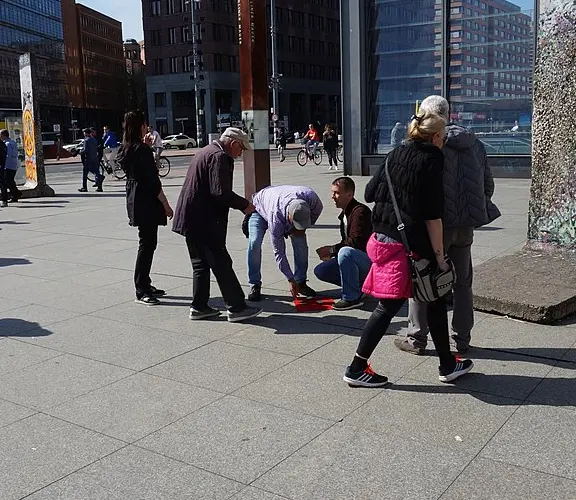
See Something Say Something
Crime Stoppers of Nevada
Crime Stoppers is a community-based organization dedicated to fostering a safer environment by empowering citizens to report information about criminal activities anonymously.
To report a crime or provide an anonymous tip about one, contact them at (702) 385-5555 or visit crimestoppersofnv.com.
Tourist Safety in Las Vegas FAQs
Stick to well-populated areas like the Las Vegas Strip and Fremont Street. Avoid walking alone at night, secure your belongings, and be cautious with personal information. Choose reputable accommodations and follow hotel and casino safety guidelines.
In case of an emergency, dial 911 for police, fire, or medical assistance. Las Vegas has several hospitals and urgent care centers, including University Medical Center and Sunrise Hospital and Medical Center. Familiarize yourself with the nearest medical facilities to your accommodation.
Be wary of street performers asking for money, unsolicited offers for free show tickets, and overly friendly strangers. Always verify the legitimacy of any offers and avoid sharing personal information with unknown individuals. Use reputable sources to purchase tickets and services.
Use taxi cabs, ride-shares, or the city bus system for safer travel, especially at night. Avoid walking long distances alone. If you drive, park in well-lit areas and check your surroundings before getting into your vehicle.
Tourists should avoid neighborhoods near UNLV, around the Stratosphere, and the areas west of the Strip. Also, avoid East Fremont Street beyond the main downtown area, Naked City, certain parts of North and West Las Vegas, Industrial Road, Boulder Highway, Carey Avenue, and Twain Avenue. Stay away from flood-control tunnels due to safety hazards.
Las Vegas police officers wear distinct uniforms: yellow for traffic officers, brown for corrections officers, tan for patrol officers, and volunteers usually wear white shirts with the LVMPD logo. They use various patrol methods, including foot, car, bicycle, motorcycle, and equestrian patrols.
Report any suspicious activity to hotel security or dial 911 if it’s an emergency. For non-emergencies, contact Las Vegas Metro Police at (702) 795-3111, Henderson Police at (702) 267-5000, or North Las Vegas Police at (702) 633-9111.
Keep your bags close and closed. Avoid displaying expensive items. Use a money belt or secure bag for valuables, and never leave your belongings unattended. Be particularly vigilant in crowded areas like the Strip and Fremont Street.
To stay safe from spiked drinks in Las Vegas, only accept them from bartenders or wait staff, never leave your drink unattended, watch your drink being made, and be mindful of accepting drinks from strangers. Utilize the buddy system to keep an eye on each other’s drinks.
Be cautious of street performers demanding hefty tips, high-pressure timeshare presentations, taxi long-hauling, ride-share surge pricing, counterfeit tickets, bogus tour operators, and street gambling games like Three-Card Monte. Always verify the legitimacy of any offers and use reputable sources for services and purchases.
Avoid engaging with strangers offering companionship or sexual services, especially in casinos, bars, or nightclubs. If you decide to go to a private location, ensure you keep your belongings secure and remain cautious of your surroundings. It’s safer to avoid these situations altogether to reduce the risk of theft.
Use reputable taxi services and ride-share apps that provide route tracking. Avoid unmarked vehicles and never accept unsolicited offers for rides. Research the best routes to your destination to avoid long-hauling by taxi drivers.
Avoid sharing personal or financial information with unknown individuals or unverified websites. Use secure ATMs located inside banks or well-lit areas, and be cautious when using public Wi-Fi networks. Use credit cards over debit cards for added security against fraud.
Keep your cash winnings as credits in the machine until you’re ready to cash out. Avoid leaving your slot machine or table unattended. Be discreet about your winnings and avoid carrying large amounts of cash. Use casino security services if you feel threatened or need assistance.
Stick to crowded and well-lit areas, avoid walking alone, and use secure transportation options like taxis, ride-shares, or public transportation. Stay on the main streets and avoid side streets or alleys.
Be polite but cautious. Understand that some may pressure you for money after a photo or interaction. It’s best to avoid engaging with them if you’re not interested. If you choose to interact, have a small amount of cash ready for tipping.
Exercise extra caution in areas like Naked City, East Fremont Street beyond the main downtown area, neighborhoods near UNLV, and industrial areas west of the Strip. Always stay in well-populated and well-lit areas.
Always purchase tickets from reputable sources, such as official venue box offices or trusted online platforms. Avoid buying tickets from scalpers or unofficial sellers, as these are often counterfeit or overpriced.
Politely decline and leave the presentation if you feel uncomfortable. You are under no obligation to stay or purchase anything. Research and consider your options carefully before committing to any timeshare deals.
Verify the driver’s identity and vehicle details through the ride-share app before getting in. Share your trip details with a friend or family member and follow the route on the app. If anything feels off, trust your instincts and exit the vehicle safely.
Use ATMs located inside banks or well-lit, busy areas. Avoid using standalone ATMs or those in secluded locations. Check for skimming devices and cover your PIN when entering it. Use credit cards over debit cards for added protection against fraud.
Public transportation, such as the city bus system, is generally safe. However, be aware of your surroundings and avoid isolated bus stops, especially at night. Keep your belongings secure and sit near the driver or in well-populated areas of the bus.
Look for unusual attachments or loose parts around the card slot. Cover your hand when entering your PIN and use ATMs inside banks or well-lit areas. Avoid using ATMs in isolated or poorly lit locations.
Arrive early to familiarize yourself with the venue’s layout, including emergency exits. Stay alert to your surroundings, keep your belongings secure, and avoid carrying large amounts of cash. If attending with friends, agree on a meeting point in case you get separated.
Politely but firmly decline offers and walk away if you feel pressured. Purchase items from licensed shops and avoid buying from street vendors who may sell low-quality or counterfeit goods.
Keep updated with local news and advisories, follow safety guidelines provided by your hotel, and consult reliable travel resources. Download apps or visit websites for real-time updates on transportation, weather, and local safety alerts.
Contact Crime Stoppers of Nevada at (702) 385-5555 or visit their website at crimestoppersofnv.com to provide anonymous tips about criminal activities.
Vital Visitor Safety Related Links:
- Las Vegas Crime Statistics
- Henderson Crime Statistics
- North Las Vegas Crime Statistics
- United States Crime Statistics
- Las Vegas Metropolitan Police Department
- LVMPD Crime Statistics & Transparency
- North Las Vegas Police Department
- Henderson Police Department
- Boulder City Police Department
- Mesquite Police Department
- Nye County Sheriff
- Nevada Department of Safety
- NV DOJ – Office of the Attorney General
- U.S. Department of Justice
- Nevada Homeland Security
- Federal Bureau of Investigation
